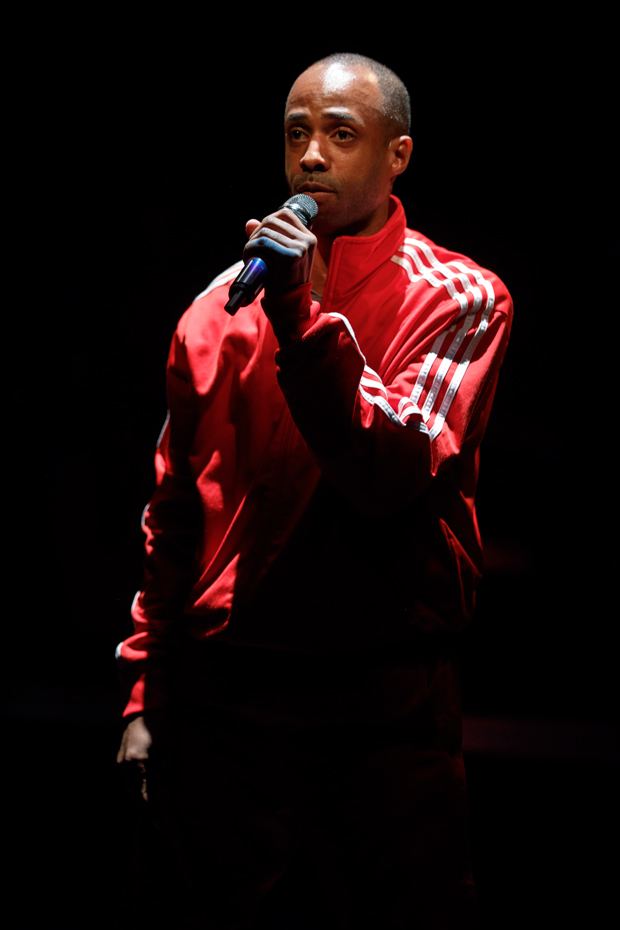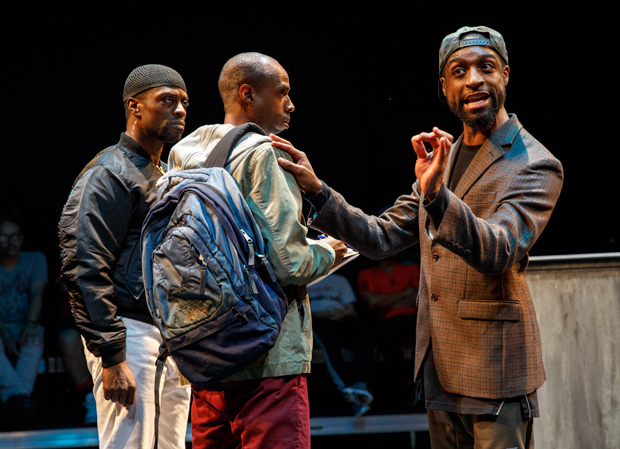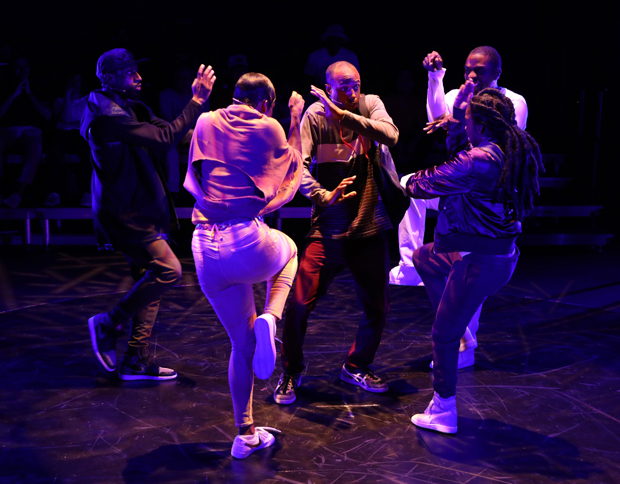Syncing Ink

(© Joan Marcus)
Calling Syncing Ink a "hip-hop musical" only grazes the depth of its ambition. NSangou Njikam's show, making its New York premiere at the Flea Theater, is, at its core, a coming-of-age chronicle of an aspiring rapper named Gordon (played by Njikam himself). But Njikam's aspiration for this tale is somewhat loftier: the birth of an artist as a grand mythical epic. The characters are given nicknames corresponding to certain Yoruba gods (one character is termed Oludumare, "the supreme creator," while another is nicknamed Osun, or "the womb of creativity"). The prologue has Gordon perched in the middle of a circle in a fetal position while the rest of the cast surrounds him, conferring with each other, chanting as they prepare for their mission to turn this shy, book-smart teenager into a hot-fire-spitting free-stylist.
Despite such mystical trappings, there's nothing heavy-feeling about Syncing Ink, which instead, under Niegel Smith's direction, exudes the stylistic exuberance of the best hip-hop cuts. Smith frequently switches between realism and surrealism on a dime in his staging; Ice Cold (Elisha Lawson) demands a scene be rewound just to point out a contradiction to Gordon; one character speaks for another while the other character mouths the words out of sync in the manner of a English-dubbed Hong Kong action flick. The raucous energy Smith brings to the production matches the lightning-fast rhymes many of the actors spout, delivered with the burning-bright conviction of performers who fully believe in the story they're telling.
The story Syncing Ink tells is rather thin for the two-hour-and-45-minute run time, and the characters never progress beyond the one-dimensional. But then, most myths aren't known for psychological nuance; when it comes to gods, even self-proclaimed ones, human complexity is the last thing one expects from them. Still, for those who go into this show without a deep knowledge of the history and customs of hip-hop, Syncing Ink may come off as little more than a for-fans-only proposition. Beyond a few helpful segments in which Ice Cold instructs Gordon on the finer points of being a hip-hop emcee — including adopting an unsmiling facial expression and developing martial-arts-like hand gestures playfully termed "God Hands" — Syncing Ink remains locked into its magical-realist universe, often feeling as insular as the relatively petty rivalries that animate the drama.

(© Joan Marcus)
Njikam does touch on a more specific, and more interesting, conflict, through the way he pits younger characters against older ones: Jamal (Nuri Hazzard) vs. AP English teacher Mr. Wright (Adesola Osakalumi) in Act 1, and radical professor Baba Black (also Osakalumi) vs. the more classically oriented Professor Brown (also Hazzard) in Act 2, with the former characters exemplars of looking ahead with their art and the latter ones spokespeople for celebrating the African-American art of the past. Both James Baldwin and Ice-T were reacting to social forces surrounding them in their own distinct ways, and Gordon finds himself torn between honoring his ancestors' artistic heritage while trying to find a new trail to blaze for himself.
Syncing Ink, however, ultimately evinces little interest in seriously grappling with hip-hop's legacy and future. If anything, Njikam fully buys into the macho braggadocio embodied by Jamal, only paying lip service to the genuine social unrest from which the form arose. Njikam's treatment of the female characters — all of them played by both Kara Young and McKenzie Frye — feels similarly superficial in its outwardly enlightened attitudes, as, despite their occasional assertions of agency, they basically exist only to aid in the male characters' growth.
As sheer spectacle, however, Syncing Ink is often exhilarating. Riccardo Hernandez's scenic design and Kevin Rigdon's lighting find myriad imaginative ways to suggest different settings and time periods within a circular space. As The Mutha — the God-like figure who watches over the play's events from her perch overlooking the set — DJ Reborn offers a soundtrack filled with well-chosen samples that feels consistently keyed into the characters' psychological states. Above all, Njikam's show offers a brilliant display of the physical and vocal prowess of its performers, all of whom make memorable impressions with their distinctive characters. Syncing Ink is the equivalent of a less-than-great album with just enough great singles to make the experience still worthwhile.

(© Joan Marcus)











